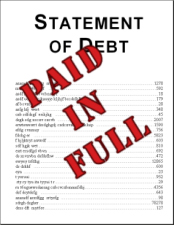My second year at college I made the mistake of trying to do too much. In addition to classes, homework and Church callings, I also had a job as a Janitor which began at 4:00 am. As a foolish 19 year old, I didn’t want to give any of these things up, so I didn’t get much sleep. By mid Semester I got strep throat and then mononucleosis. It was severe enough I had to quit school and go home. This meant I had to pay back a $500.00 grant I had received.
Since I didn’t have the money to pay this debt, my parents came to my rescue and paid it for me. This rescue came with conditions though, since I had to pay them back. Basically they re-financed my debt and gave me their “terms” for payment: which meant that I had to paint the house. I was very grateful for what they did because I wouldn’t have been able to pay my debt to the college.
This week’s Gospel Doctrine lesson teaches what one gains through Christ’s Atonement. When I read the statement from Boyd K. Packer on page six, it reminded me of what my parents had done for me. This quote is from his General Conference talk where he introduces a Parable used in several official Church manuals today. He teaches that through the Atonement, Jesus becomes our creditor.
Similar to what my parents did for me in college, Jesus comes to our rescue and pays our debt of sin to Heavenly Father—but through this rescue our debt merely gets refinanced! We now have to pay our debt to Jesus!
The Parable tells the story of a foolish man who incurred a great debt. This debt is symbolic of the spiritual debt we owe to Heavenly Father for our sins. The foolish man couldn’t pay his debt so Jesus comes to his rescue and pays his debt for him. After Heavenly Father accepts His payment, Jesus turns to the man and says:
“If I pay your debt, will you accept me as your creditor? ‘Oh yes, yes,’ cried the debtor. ‘You saved me from prison and show mercy to me.’ “Then, said the benefactor, ‘you will pay the debt to me and I will set the terms. It will not be easy, but it will be possible.”
Gospel Principles explains the meaning of this parable:
“Our sins are our spiritual debts. Without Jesus Christ, who is our Savior and Mediator, we would all pay for our sins by suffering spiritual death. But because of him, if we will keep his terms, which are to repent and keep his commandments, we may return to live with our Heavenly Father.” (p. 65)
This Creditor, the Christ of Mormonism; is not really Christ, the Son of God and our Savior. Because of what Jesus has done for me, I have such a passion to share the truth with you! I am Christ’s Ambassador and He has committed to me His “ministry of reconciliation” (2 Corinthians 5:18-21). In this way I am a “debt consolidation counselor”. My counsel to you is that your debt to sin has been canceled, not refinanced!
When Jesus shed His blood on the cross he paid for every sin for the entire world! No more debt is left to be paid. Jesus doesn’t demand a “second payment” for sin, nor does He give you additional “terms” that must be done. Every single sin has already been paid for with Christ’s precious blood. Through His Atonement you are debt free!

On the cross Jesus cried out 'It is Finished!', in the Greek literally 'Paid in Full!'
In the book of John we read that just before Jesus died on the cross he exclaimed “It is finished!” In Greek this meant: “Paid in full”! This was also written on business documents or receipts during New Testament times to show that a bill had been paid in full.
The connection between receipts and what Jesus had accomplished would have been very clear to the Apostle John’s Greek speaking readers. It would be unmistakable to them that Jesus had paid the full price for their sins. You also can know that the bill listing your sin debt has been stamped “Paid in full”! Trust in these promises from Christ’s Apostles and please, don’t reject your Saviors amazing gift through unbelief.
Believe these beautiful words:
“And all things are of God, who hath reconciled us to himself by Jesus Christ, and hath given to us the ministry of reconciliation; To wit, that God was in Christ, reconciling the world unto himself, not imputing their trespasses unto them; and hath committed unto us the word of reconciliation.
Now then we are ambassadors for Christ, as though God did beseech you by us: we pray you in Christ’s stead, be ye reconciled to God. For he hath made him to be sin for us, who knew no sin; that we might be made the righteousness of God in him.” (2 Corinthians 5: 18-21)
Links to Packer’s Parable Found at LDS.org:
Original Parable given by Boyd K. Packer:
https://www.lds.org/general-conference/1977/04/the-mediator?lang=eng
Gospel Principles:
https://www.lds.org/manual/gospel-principles/chapter-12-the-atonement?lang=eng
Preparing for Exaltation: Teacher’s Manual for 12 & 13 year olds:
https://www.lds.org/manual/preparing-for-exaltation-teachers-manual?lang=eng
Aaronic Priesthood Manual 3:
https://www.lds.org/manual/print/aaronic-priesthood-manual-3/lesson-9-justice-and-mercy?lang=eng
Friend, Mar 2004:
https://www.lds.org/friend/2004/03/repentance-and-the-atonement?lang=eng
New Testament Gospel Doctrine Teacher’s Manual, Lesson 25: “Not My Will, But Thine, Be Done”:
https://www.lds.org/manual/new-testament-gospel-doctrine-teachers-manual/lesson-25-not-my-will-but-thine-be-done?lang=eng
You must be logged in to post a comment.